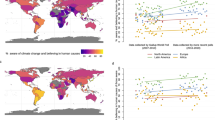Abstract
In this paper, we seek to identify robust predictors of individuals’ attitudes towards climate change and environmental degradation. While much of the extant literature has been devoted to the individual explanatory potential of individuals’ characteristics, we focus on the extent to which these characteristics provide robust predictions of climate and environmental attitudes. Thereby, we adjudicate the relative predictive power of psychological and sociodemographic characteristics, as well as the predictive power of combinations of these attributes. To do so, we use a popular machine learning technique, Random Forests, on three surveys fielded in China, Switzerland, and the USA, using a variety of outcome variables. We find that a psychological construct, the consideration of future consequences (CFC) scale, performs well in predicting attitudes, across all contexts and better than traditional explanations of climate attitudes, such as income and education. Given recent advances suggesting potential psychological barriers of behavioural change Public (Weaver, Adm Rev 75:806–816, 2015) and the use of psychological constructs to target persuasive messages (Abrahamse et al., J Environ Psychol 265–276, 2007; Hirsh et al., Psychol Sci 23:578–581, 2012), identifying important predictors, such as the CFC may allow to better understand public’s appetite for climate and environmental policies and increase demand for these policies, in an area where existing efforts have shown to be lacking (Bernauer and McGrath, Nat Clim Chang 6:680–683, 2016; Chapman et al., Nat Clim Chang 7:850–852, 2017).




Similar content being viewed by others
Notes
For a notable exception see Lee et al. (2015).
Full item wording is located in the supplementary information (see Section SI.1).
For full description of these variables see Section SI.1. Due to the political landscape in China, we could neither ask party identification nor political ideology.
Our test and train data are constructed by randomly splitting our data in half.
In a bivariate regression, the R2 is equal to Pearson’s r, squared.
One can think of these being the “settings” of the model.
References
Abrahamse W, Steg L, Vlek C et al (2007) The effect of tailored information, goal setting, and tailored feedback on household energy use, energy-related behaviors, and behavioral antecedents. J Environ Psychol 27:265–276
Ajzen I (1991) The theory of planned behavior. Organ Behav Hum Decis Process 50:179–211
Anderson B, Böhmelt T, Ward H (2017) Public opinion and environmental policy output: a cross-national analysis of energy policies in Europe. Environ Res Lett 12:1–10
Ansolabehere S, Hersh E (2013) Gender, race, age and voting: a research note. Politics and Governance 1:132–137
Bamberg S, Möser G (2007) Twenty years after Hines, Hungerford, and Tomera: a new meta-analysis of psycho-social determinants of pro-environmental behaviour. J Environ Psychol 27:14–25
Beiser-McGrath LF, Bernauer T (2018) Private provision of global public goods: how international reciprocity affects public support for climate policy. Working Paper
Bernauer T, McGrath LF (2016) Simple reframing unlikely to boost public support for climate policy. Nat Clim Chang 6:680–683
Blocker TJ, Eckberg DL (1989) Environmental issues as women’s issues: general concerns and local hazards. Soc Sci Q 70:586–593
Blocker TJ, Eckberg DL (1997) Gender and environmentalism: results from the 1993 general social survey. Soc Sci Q 78:841–858
Borden RJ, Francis JL (1978) Who cares about ecology? Personality and sex differences in environmental concern. J Pers 46:190–203
Breiman L (2001) Random Forests. Mach Learn 45:5–32
Bruderer-Enzler H (2015) Consideration of future consequences as a predictor of environmentally responsible behavior: evidence from a general population study. Environ Behav 47:618–643
Chapman DA, Lickel B, Markowitz EM (2017) Reassessing emotion in climate change communication. Nat Clim Chang 7:850–852
Clayton SD, Myers G (2015) Conservation psychology: understanding and promoting human care for nature, 2nd edn. Wiley, New York
Colby SL, Ortman JM (2014) Projections of the size and composition of the U.S. population: 2014 to 2060. current population reports, P25-1143, US Census Bureau, Washington, DC P25-1143
De Groot JIM, Steg L (2007) Value orientations and environmental beliefs in five countries: validity of an instrument to measure egoistic, altruistic and biospheric value orientations. J Cross-Cult Psychol 38:318–332
de Groot JIM, Steg L (2008) Value orientations to explain beliefs related to environmental significant behavior: how to measure egoistic, altruistic, and biospheric value orientations. Environ Behav 40:330–354
Diekmann A, Preisendörfer P (2001) Umweltsoziologie: eine Einführung. Rororo Rowohlts Enzyklopädie, Rowohlt-Taschenbuch-Verl
Dubois D, Rucker DD, Galinsky AD (2016) Dynamics of communicator and audience power: the persuasiveness of competence versus warmth. J Consum Res 43:68–85
Dür A, Mateo G (2014) Public opinion and interest group influence: how citizen groups derailed the Anti-Counterfeiting Trade Agreement. Journal of European Public Policy 21:1199–1217
Fiorina MP, Abrams SJ (2008) Political polarization in the American public. Annual Review of Political Science 11:563–588
Fiorina MP, Abrams SA, Pope JC (2008) Polarization in the American public: misconceptions and misreadings. The Journal of Politics 70:556–560. 00193
Fishbein M, Ajzen I (1975) Belief, attitude, intention and behavior: an introduction to theory and research. Addison-Wesley Pub. Co, Reading
Franzen A, Vogl D (2013) Two decades of measuring environmental attitudes: a comparative analysis of 33 countries. Glob Environ Chang 23:1001–1008
Gifford R (2008) Psychology’s essential role in alleviating the impacts of climate change. Canadian Psychology/Psychologie canadienne 49:273–280
Hines JM, Hungerford HR, Tomera AN (1987) Analysis and synthesis of research on responsible environmental behavior: a meta-analysis. The Journal of Environmental Education 18:1–8
Hirsh JB, Dolderman D (2007) Personality predictors of consumerism and environmentalism: a preliminary study. Personal Individ Differ 43:1583–1593
Hirsh JB, Kang SoK, Bodenhausen GV (2012) Personalized persuasion: tailoring persuasive appeals to recipients’ personality traits. Psychol Sci 23:578–581
Hornsey MJ, Harris EA, Bain PG et al (2016) Meta-analyses of the determinants and outcomes of belief in climate change. Nat Clim Chang 6:622–626
Huber RA, Anderson B, Bernauer T (forthcoming) Can social norm interventions promote voluntary pro environmental action? Environ Sci Policy
Inglehart R (1995) Public support for environmental protection: objective problems and subjective values in 43 societies. PS: Political Science and Politics 28:57
ISSP Research Group (2012). International Social Survey Programme: Environment III - ISSP 2010
Layman GC, Carsey TM, Horowitz JM (2006) Party polarization in American politics: characteristics, causes, and consequences. Annual Review of Political Science 9:83–110
Lee TM, Markowitz EM, Howe PD et al (2015) Predictors of public climate change awareness and risk perception around the world. Nat Clim Chang 5:1014–1020
Lewandowsky S, Oberauer K, Gignac GE (2013) NASA faked the moon landing—therefore, (climate) science is a hoax: an anatomy of the motivated rejection of science. Psychol Sci 24:622–633
Liaw A, Wiener M (2002) Classification and Regression by random Forest. R News 2:18–22
Lorenzoni I, Nicholson-Cole S, Whitmarsh L (2007) Barriers perceived to engaging with climate change among the UK public and their policy implications. Glob Environ Chang 17:445–459
Matz SC, Kosinski M, Nave G et al (2017) Psychological targeting as an effective approach to digital mass persuasion. Proceedings of the National Academy of Sciences 114:12714–12719
McCright AM, Dunlap RE (2003) Defeating Kyoto: the conservative movement’s impact on U.S. climate change policy. Soc Probl 50:348–373
McCright AM, Dunlap RE (2011) The politicization of climate change and polarization in the American public’s views on global warming, 2001–2010. Sociol Q 52:155–194
Mindenberger M, Tingley D (2017) Beliefs about climate beliefs: the importance of second-order opinions for climate politics. British Journal of Political Science. 1–29
Mildenberger M, Marlon JR, Howe PD et al (2017) The spatial distribution of Republican and Democratic climate opinions at state and local scales. Clim Chang 145:539–548
Milfont TL, Sibley CG (2012) The big five personality traits and environmental engagement: associations at the individual and societal level. J Environ Psychol 32:187–195
Milfont TL, Wilson J, Diniz P (2012) Time perspective and environmental engagement: a meta-analysis. Int J Psychol 47:325–334
Mohai P (1992) Men, women, and the environment: an examination of the gender gap in environmental concern and activism. Society & Natural Resources 5:1–19
Muchlinski D, Siroky D, He J et al (2016) Comparing random forest with logistic regression for predicting class-imbalanced civil war onset data. Political Analysis 24:87–103
Oehl B, Schaffer LM, Bernauer T (2017) How to measure public demand for policies when there is no appropriate survey data? Journal of Public Policy 37:173–204
Pettus AM, Giles MB (1987) Personality characteristics and environmental attitudes. Popul Environ 9:127–137
Poortinga W, Steg L, Vlek C (2004) Values, environmental concern, and environmental behavior: a study into household energy Use. Environ Behav 36:70–93
R Core Team (2015) R: a language and environment for statistical computing. Vienna, Austria: R Foundation for Statistical Computing Retrieved from https://wwwR-projectorg/.
Schmuck P, Schultz WP (eds) (2002) Psychology of sustainable development. Springer, New York
Shmueli G (2010) To Explain or to Predict?. Stat Sci 25:289–310
Steg L, Vlek C (2009) Encouraging pro-environmental behaviour: an integrative review and research agenda. J Environ Psychol 29:309–317
Steg L, Berg AEvd, De Groot JIM (2013) Environmental psychology: an introduction. Malden, MA, Wiley
Steg L, Bolderdijk JW, Keizer K et al (2014) An integrated framework for encouraging pro-environmental behaviour: the role of values, situational factors and goals. J Environ Psychol 38:104–115
Stern PC (1992) Psychological dimensions of global environmental change. Annu Rev Psychol 43:269–302
Stern PC, Dietz T, Kalof L (1993) Value orientations, gender, and environmental concern. Environ Behav 25:322–348
Strathman A, Gleicher F, Boninger DS et al (1994) The consideration of future consequences: weighing immediate and distant outcomes of behavior. J Pers Soc Psychol 66:742–752
Weaver RK (2015) Getting people to behave: research lessons for policy makers. Public Adm Rev 75:806–816
Wei W, Lu JG, Galinsky AD et al (2017) Regional ambient temperature is associated with human personality. Nature Human Behaviour 1:890–895
Whitmarsh L (2011) Scepticism and uncertainty about climate change: dimensions, determinants and change over time. Glob Environ Chang 21:690–700
Wlezien C (1995) The public as thermostat: dynamics of preferences for spending. Am J Polit Sci 39:981–1000
Acknowledgments
We are grateful to the comments and suggestions by two anonymous reviewers and the editors that have greatly improved this manuscript. We would like to thank Thomas Bernauer for his contribution to the data collection in the China, Switzerland, and the US. We also thank Brilé Anderson for her contribution to the data collection in Switzerland. We would also like to thank Dennis Atzenhofer and Michael Hudecheck for their research assistance and the Strassenverkehrsamt Zürich for the cooperation throughout the data collection in Zurich.
Funding
The research for this article was funded by the ERC Advanced Grant ‘Sources of Legitimacy in Global Environmental Governance’ (Grant: 295456) and supported by ETH Zürich.
Author information
Authors and Affiliations
Corresponding author
Electronic supplementary material
Below is the link to the electronic supplementary material.
Rights and permissions
About this article
Cite this article
Beiser-McGrath, L.F., Huber, R.A. Assessing the relative importance of psychological and demographic factors for predicting climate and environmental attitudes. Climatic Change 149, 335–347 (2018). https://doi.org/10.1007/s10584-018-2260-9
Received:
Accepted:
Published:
Issue Date:
DOI: https://doi.org/10.1007/s10584-018-2260-9




